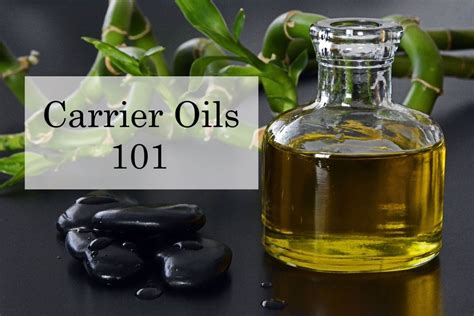Essential oils are highly concentrated plant extracts that are known for their potent therapeutic properties. However, their potency also requires dilution before topical application to prevent skin irritation. Carrier oils play a crucial role in this process, delivering essential oils safely and enhancing their absorption.

Understanding Carrier Oils: A Comprehensive Guide
Carrier oils are plant-based oils that are typically obtained from seeds, nuts, or kernels. They are rich in fatty acids and other nourishing compounds, making them ideal for skin care. When combined with essential oils, carrier oils act as a diluent, reducing the essential oil’s concentration and allowing it to be applied without causing adverse reactions.
Types of Carrier Oils: Exploring the Diverse Options
The choice of carrier oil depends on the desired application and individual skin type. Here are some popular carrier oils and their key characteristics:
| Carrier Oil | Fatty Acid Profile | Properties |
|---|---|---|
| Jojoba Oil | High in monounsaturated fatty acids | Absorbs quickly, non-comedogenic, suitable for all skin types |
| Coconut Oil | High in saturated fatty acids | Solid at room temperature, provides deep hydration, anti-inflammatory |
| Argan Oil | Rich in antioxidants and vitamin E | Nourishes and protects skin, ideal for mature or dry skin |
| Sweet Almond Oil | High in monounsaturated and polyunsaturated fatty acids | Lightweight, hypoallergenic, suitable for sensitive skin |
| Grapeseed Oil | High in linoleic acid | Absorbs quickly, non-greasy, suitable for acne-prone skin |
It’s important to note that some carrier oils, such as castor oil, are not suitable for topical use undiluted due to their thick consistency. Always consult with a qualified healthcare professional before applying essential oils topically, especially when using new carrier oils.
Benefits of Using Carrier Oils: Enhancing the Essential Oil Experience
Using carrier oils offers numerous benefits that enhance the efficacy and safety of essential oils:
- Improved Absorption: Carrier oils aid in the absorption of essential oils through the skin, allowing them to penetrate deeper and provide greater therapeutic effects.
- Controlled Concentration: Carrier oils dilute essential oils, reducing their concentration and making them safe for direct application.
- Reduced Skin Irritation: The nourishing properties of carrier oils protect the skin from potential irritation caused by the concentrated essential oils.
- Enhanced Stability: Carrier oils help preserve the volatile compounds in essential oils, increasing their shelf life and effectiveness.
The ratio of carrier oil to essential oil varies depending on the desired application and the potency of the essential oil. A general guideline is to use a 2-5% dilution rate, which means mixing 2-5 drops of essential oil with 98-95 drops of carrier oil.
Innovative Applications: Unveiling the Potential of Carrier Oils
Beyond their traditional role in diluting essential oils, carrier oils offer a range of innovative applications:
- Carrier Oils for Massage: Carrier oils can be used as a base for massage blends, providing a silky texture and enhanced absorption of essential oils.
- Carrier Oils for Skin Care: Carrier oils can be incorporated into DIY skincare products, such as lotions, serums, and body scrubs, to nourish and protect the skin.
- Carrier Oils for Hair Care: Carrier oils can be used for hair conditioning, adding moisture and shine, and promoting scalp health.
- Carrier Oils for Aromatherapy: Carrier oils can be used as a base for room diffusers or personal inhalers, allowing for the controlled release of essential oil aromas.
By exploring these innovative applications, you can harness the full potential of carrier oils and unlock a world of possibilities for enhancing your essential oil experience.
Safety Considerations: Essential Guidelines for Carrier Oil Use
While carrier oils are generally safe for topical use, it’s essential to follow these guidelines:
- Quality Matters: Choose high-quality, cold-pressed, and organic carrier oils to ensure their purity and efficacy.
- Skin Sensitivity: Test a small amount of the diluted essential oil blend on a patch of your skin before applying it to a larger area.
- Avoid Ingestion: Carrier oils are not intended for ingestion, as they may cause digestive upset or other adverse effects.
- Store Properly: Store carrier oils in a cool, dark place to preserve their quality and prevent rancidity.
Conclusion: Unlocking the Power of Synergy
Carrier oils are essential partners in the world of essential oils, providing a safe and effective way to experience their therapeutic benefits. By understanding the types, benefits, and innovative applications of carrier oils, you can elevate your essential oil experience and unlock a world of possibilities for natural healing and well-being. Embrace the power of synergy and let carrier oils enhance the potency of your essential oils, unlocking their full potential for health and vitality.
